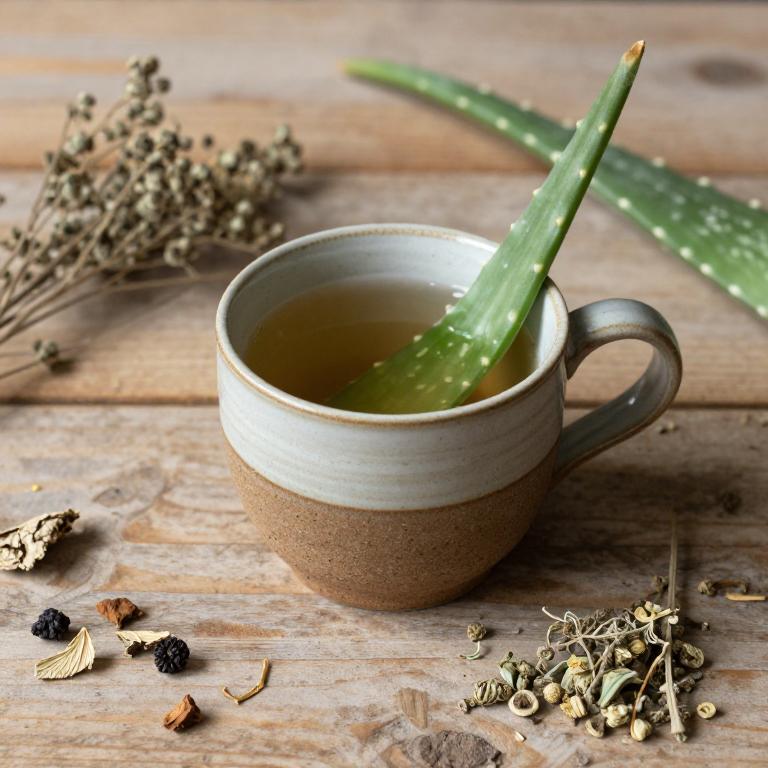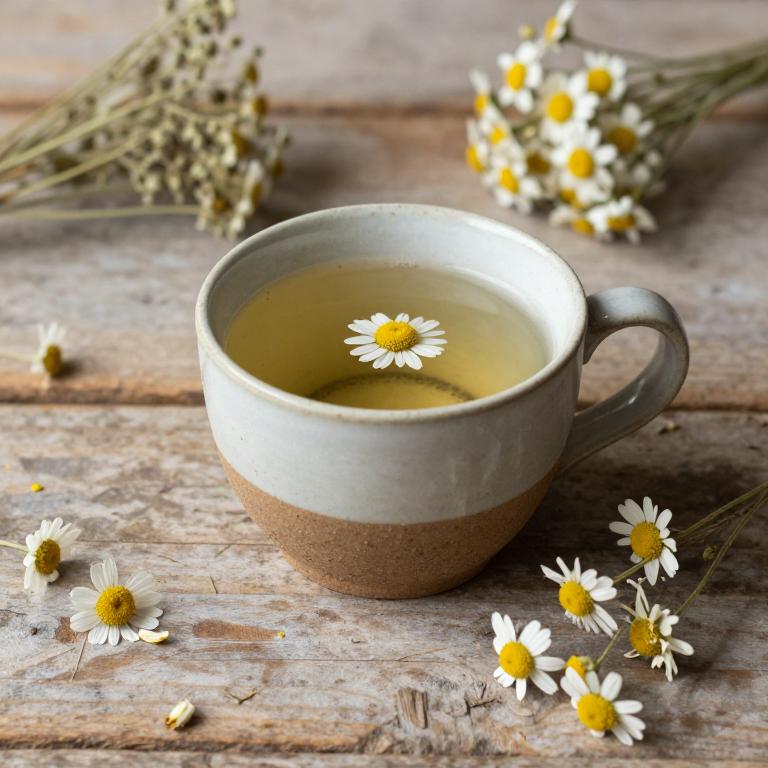10 Best Herbal Teas For Rashes

Herbal teas can be a natural and soothing remedy for various types of rashes, offering gentle relief without the harsh side effects of conventional treatments.
Chamomile, calendula, and oatmeal-based teas are commonly used due to their anti-inflammatory and calming properties that help reduce redness and irritation. These teas can be applied topically by soaking a cloth or using a compress, or consumed internally to support the body's healing process. They are particularly beneficial for eczema, sunburn, or contact dermatitis, though it's important to perform a patch test to avoid allergic reactions.
Overall, herbal teas provide a safe and accessible option for managing rash-related discomfort.
Table of Contents
- 1. Chamomile (Matricaria chamomilla)
- 2. Camellia (Camellia sinensis)
- 3. Stinging nettle (Urtica dioica)
- 4. St. john's wort (Hypericum perforatum)
- 5. Aloe vera (Aloe barbadensis)
- 6. Salvia (Salvia officinalis)
- 7. Dog rose (Rosa canina)
- 8. German chamomile (Chamomilla recutita)
- 9. Field horsetail (Equisetum arvense)
- 10. English lavender (Lavandula angustifolia)
1. Chamomile (Matricaria chamomilla)

Matricaria chamomilla, commonly known as chamomile, is a popular herbal tea used for its soothing and anti-inflammatory properties.
Chamomile tea is often recommended for individuals experiencing skin rashes due to its ability to calm irritation and reduce redness. The tea contains compounds like apigenin and bisabolol, which have been shown to possess anti-inflammatory and antimicrobial effects. When applied topically or consumed internally, chamomile tea can help alleviate symptoms associated with eczema, psoriasis, and other inflammatory skin conditions.
However, it is important to consult a healthcare provider before using chamomile, especially if you have allergies or are taking medications.
2. Camellia (Camellia sinensis)

Camellia sinensis, the plant from which green and black teas are derived, contains bioactive compounds such as polyphenols and catechins that may help soothe skin irritation.
These antioxidants have anti-inflammatory properties that can reduce redness and swelling associated with rashes. While Camellia sinensis itself is not typically used directly for rashes, herbal teas made from its leaves may support overall skin health when consumed internally. Some people use topical applications of tea-infused compresses to alleviate symptoms of mild skin irritations.
However, it is important to consult a healthcare professional before using Camellia sinensis products for persistent or severe rashes.
3. Stinging nettle (Urtica dioica)

Urtica dioica, commonly known as stinging nettle, is often used in herbal teas to help alleviate symptoms of rashes due to its anti-inflammatory and antihistamine properties.
The leaves of the plant contain compounds that can reduce skin irritation and redness, making it a popular remedy for conditions like eczema and hives. When brewed into a tea, stinging nettle can help soothe the skin and reduce the body’s allergic response. However, it is important to consult with a healthcare provider before using it, especially if you have a known allergy or are taking medications.
Regular consumption of urtica dioica tea may support overall skin health and provide natural relief for various types of rashes.
4. St. john's wort (Hypericum perforatum)

Hypericum perforatum, commonly known as St. John's Wort, is a herbal remedy that has been traditionally used for its potential anti-inflammatory and antiseptic properties.
When prepared as a tea, it may help alleviate skin rashes by reducing redness, itching, and irritation. The active compounds in hypericum perforatum, such as hyperforin and hypericin, are believed to have soothing effects on the skin. However, it is important to consult a healthcare professional before using this herb, as it can interact with certain medications.
While some people find relief from using St. John's Wort tea for rashes, individual results may vary, and it should not replace professional medical advice.
5. Aloe vera (Aloe barbadensis)

Aloe barbadensis, commonly known as aloe vera, is often used in herbal teas to soothe skin irritations and rashes due to its anti-inflammatory and moisturizing properties.
When brewed into a tea, aloe vera can help reduce redness, itching, and swelling associated with various types of skin rashes. The soothing effects of aloe vera are attributed to its high concentration of vitamins, minerals, and antioxidants that promote skin healing. While drinking aloe vera tea may offer internal benefits, topical application is typically more effective for treating rashes.
It is important to use aloe vera products that are specifically formulated for external use and to consult a healthcare professional if the rash persists or worsens.
6. Salvia (Salvia officinalis)

Salvia officinalis, commonly known as sage, has been traditionally used in herbal teas to soothe skin irritations and rashes due to its anti-inflammatory and antiseptic properties.
When brewed into a tea, sage can be applied topically as a compress or used internally to support overall skin health and immunity. The herb contains compounds like rosmarinic acid and flavonoids, which may help reduce redness, itching, and inflammation associated with various types of rashes. However, it is important to consult a healthcare professional before using sage tea for rashes, especially if you have sensitive skin or are pregnant.
While sage tea may offer some relief, it should not replace medical treatment for severe or persistent skin conditions.
7. Dog rose (Rosa canina)

Rosa canina, also known as rosehip, is a traditional herbal remedy commonly used in the form of tea to address skin irritations and rashes.
The tea is derived from the dried fruit of the Rosa canina plant, which is rich in bioactive compounds such as vitamin C, antioxidants, and essential oils. These components are believed to have anti-inflammatory and soothing properties that may help reduce redness, itching, and irritation associated with various types of rashes. Rosa canina tea can be used externally by applying it as a compress or internally to support overall skin health.
While it is generally considered safe, individuals with allergies to roses or other related plants should exercise caution and consult a healthcare professional before use.
8. German chamomile (Chamomilla recutita)

Chamomilla recutita, commonly known as German chamomile, is a popular herbal remedy used to soothe skin irritations and rashes due to its anti-inflammatory and antiseptic properties.
When brewed into a tea, it can be applied topically as a cool compress or used in bath water to alleviate redness, itching, and discomfort associated with rashes. The essential oils in chamomile, such as bisabolol and chamazulene, help reduce inflammation and promote skin healing. It is particularly effective for conditions like eczema, psoriasis, and insect bites.
However, it is important to perform a patch test before use, as some individuals may be allergic to chamomile, and it should be used with caution during pregnancy or under medical supervision.
9. Field horsetail (Equisetum arvense)

Equisetum arvense, commonly known as field horsetail, has been traditionally used in herbal teas to alleviate skin rashes due to its high concentration of silica and anti-inflammatory compounds.
The tea is believed to promote skin healing and reduce irritation by soothing inflamed areas and supporting the body's natural regenerative processes. However, it is important to note that while some anecdotal evidence supports its use, scientific research on its efficacy for rashes is limited. As with any herbal remedy, it is advisable to consult a healthcare professional before using equisetum arvense, especially for persistent or severe skin conditions.
Overall, equisetum arvense herbal tea may offer a natural alternative for mild rashes, but its effectiveness can vary depending on individual health and the specific nature of the rash.
10. English lavender (Lavandula angustifolia)

Lavandula angustifolia, commonly known as English lavender, is widely used in herbal teas for its calming and soothing properties.
This herb contains compounds like linalool and linalyl acetate, which have anti-inflammatory and antimicrobial effects that may help alleviate skin rashes. When brewed into a tea, lavender can be applied topically or consumed internally to reduce irritation and promote skin healing. Many people find relief from mild rashes, such as eczema or sunburn, by using lavender-infused teas as part of their skincare routine.
However, it is important to consult a healthcare professional before using lavender tea, especially for severe or persistent skin conditions.